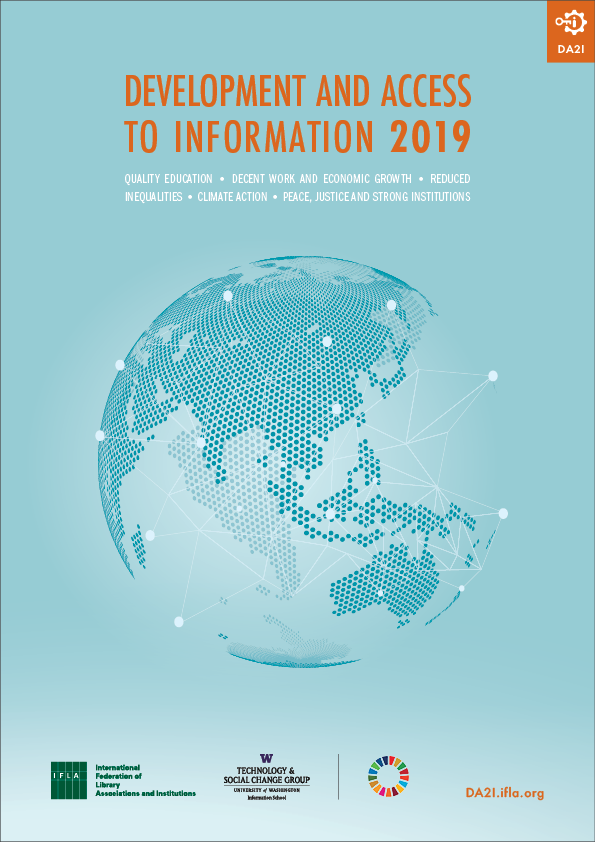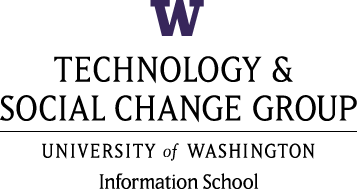
The 2019 edition was launched at the Forum of Ministers and Secretaries of Culture of Latin America and the Caribbean on 22 May, and presented during the IFLA President’s Meeting in Buenos Aires, Argentina on 23 May 2019.
The report features thematic chapters by guest authors on how access to information promotes the achievement of each of the following SDGs: Quality Education (SDG 4), Decent Work and Economic Growth (SDG 8), Reduced Inequalities (SDG 10), Climate Action (SDG 13), and Peace, Justice and Strong Institutions (SDG 16).
This second edition of Development and Access to Information report presents our first opportunity to measure global progress toward meaningful access to information, using a set of the 18 indicators identified in the original DA2I Framework in the 2017 report. This chapter provides an overview of progress grouped into three dimensions: connectivity infrastructure and use; the social context of adoption and use; and the legal and policy environment in each country. When the indicators in each of these dimensions show progress, it can be a powerful catalyst for achieving the United Nations Sustainable Development Goals (SDGs). However, progress in many areas remains elusive.
Libraries have long been at the heart of our culture, serving as both the world’s memory and its source of innovation. While the world has changed and libraries have changed with it, their core mission – providing access to information – is arguably more relevant than ever. The importance of access to information is embedded throughout the SDGs, and libraries are making real contributions. Libraries enable connectivity and access to technology, provide skills and learning for all, and strengthen democracy and accountability. When given the resources, they can be accelerators toward achieving the SDGs. This chapter explores the contribution that properly enabled libraries can make.
Education and lifelong learning are threads that run throughout the SDGs, placing a particular importance of SDG 4 – promoting inclusive, equitable, quality education. Access to information is essential for achieving the goal of education for all. It provides the basis for knowledge and the development of critical thinking skills and democratic citizenship. Libraries, in particular, have a crucial role in education by not only providing the tools to gather information online, but the skills to parse that information and turn it into useful knowledge. This essay explores how meaningful access to information can contribute to SDG 4, as well as the perils of failing to recognise this contribution and invest in it.
Access to information is a key factor in achieving SDG 8, which concerns inclusive, sustainable economic growth and employment. Information and communications technology (ICT) plays an important role in virtually every aspect of the world economy, and the internet is key to catalysing development. ICT instantly connect individuals to the world; they expand educational opportunity, spark creativity and innovation, and open the door to global financial services. They open doors to historically disadvantaged people, including women, youth and people with disabilities. But ICTs only achieve their full economic potential when people develop the necessary skills to use information meaningfully. This essay examines how ICT can be leveraged more fully for decent work and economic growth.
Knowledge is not only powerful; it is essential to any progress toward SDG 10, reducing inequalities within and among countries. More than ever, knowledge is distributed through digital technologies, meaning that the route to progress is through meaningful access to information. It is essential for digital connectivity to be reliable and sufficiently speedy everywhere, so that poor and marginalised people can benefit. However, access alone is not enough. The opportunities enabled by technology must be relevant to those who are most marginalised, who in turn must develop the skills to use it. This essay explores how libraries play this crucial role in knowledge sharing, focusing on ways in which they can contribute to poverty reduction.
Climate change, the topic of SDG 13, promises to radically reshape how and where we live. Science has long understood how human activity is polluting the planet’s atmosphere and causing global temperatures to rise faster than ever. However, large swaths of the population are either uninformed or misinformed regarding the causes and severity of the problem. This essay explores the need for meaningful access to information if we are to address the human causes of climate change and avoid its most disastrous effects. If people are to understand the science of climate change, libraries will be play a key role in providing the facts to persuade them. Then, perhaps, an informed public will elect leaders who will take the steps necessary to address the problem.
SDG 16 recognises the need to ensure public access to information and protect individual freedoms as part of achieving justice for all. Virtually from the moment the United Nations adopted the SDGs, technologies and tactics emerged on the media and internet landscape that threaten the quality of information available. Algorithmic bias, fake news, and the use of social media profiling have been weaponised to undermine elections and promote violent extremism. Meanwhile, the openness of the internet – key to UNESCO’s goal of internet universality – has become increasingly reliant on the opaque content policies of a few domain registrars. This essay explores the need for greater civic engagement to combat these and other threats, and the role libraries play in educating and informing the public.


© 2019 by the International Federation of Library Associations and Institutions (IFLA), and the Technology and Social Change Group, University of Washington (TASCHA).
This work is licensed under the Creative Commons Attribution 4.0 International license (CC BY 4.0) unless otherwise indicated.